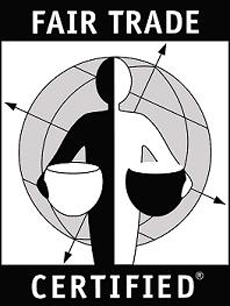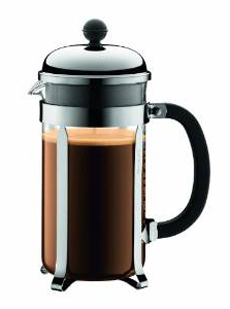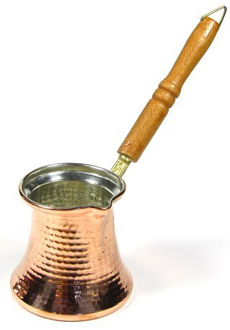
 Switch out white sugar for unrefined demarara sugar. Give a box as a gift to coffee-loving friends. Photo © Julien Bastide | Dreamstime. Switch out white sugar for unrefined demarara sugar. Give a box as a gift to coffee-loving friends. Photo © Julien Bastide | Dreamstime.
July 2005
Updated December 2025
|
|
Coffee Glossary
Page 4: Coffee Terms & Definitions F To I
Study these terms, and you’ll have a much greater appreciation of that next sip of coffee. Practice the language of coffee by using these terms to describe each cup you drink. Soon, they’ll become natural to you—and you’ll be able to educate others. This is Page 4 of a 6-page Coffee Glossary. For terms specific to espresso, see our separate Espresso Glossary. We have many more food glossaries, covering your other favorite foods.
Click on the letter of the alphabet in this bar to get to the appropriate
glossary page:
a b c d e f g h i j k l m n o p q r s t u v w x y z
This glossary is protected by copyright and cannot be reproduced in whole or in part. You are welcome to link to it.
|
FAIR TRADE CERTIFIED
This means that growers have received a fair market price for their harvest. The program contributes to a better way of life for farmers and their families, ensuring that farmers earn a profit for their labor, can feed their families, and send their children to school. Fair Trade-certified products utilize the logo at the right. More about Fair Trade.
FILTERED METHOD
Coffee brewed with a filter, where the coffee is held separate from the sitting water.
FINISH
See aftertaste.
|
|
 |
FLAVOR
The overall sensation of drinking a particular coffee. Flavor includes both taste and aroma and is influenced by both the roasting process as well as the origins of the bean. Coffee can impart a taste of the soil or even of other plants grown in the region. To fully experience the flavor, smell it first before you taste it.
FLAT or STALE
A dull or stale coffee aroma and stale, papery or cardboardy taste.
|
FLAT WHITE
The flat white, a variation of a cappuccino made with microfoam instead of regular foam, was invented in Australia in the 1970s. It is made with a single or double shot of ristretto topped with microfoam, steamed milk with small, fine bubbles, and a velvety consistency, made possible by modern milk foaming technology (which also is responsible for barista art). It is made in a smaller cup than a cappuccino, thus delivering a higher proportion of coffee to milk (similar to a cortado). It was introduced in the U.S. by Starbucks in January 2015. In order to allow the coffee flavors to dominate, it is used with a shorter, stronger pull of espresso, known as ristretto. Unlike the thick layer of foam served with a cappuccino (and to a lesser extent, a latte), a flat white has a thinner layer of microfoam.
|
|

A flat white. Photo courtesy of Starbucks. |
FLORAL or FLOWERY
Similar to the fragrance of flowers, a flavor and aroma characteristic of many coffees. The scent is slight, as opposed to bouquet-like.
|
FRAGRANCE
The aromatic sensations that are inhaled by sniffing. It can be described as ranging from floral to spicy.
FRENCH PRESS
A cylindrical glass coffee pot that steeps ground coffee in hot water and then filters it with a metal filter plunger that presses the grounds to the bottom of the pot, trapping the grounds under the filter so the coffee is served from the top. Also referred to as a plunger pot, and a cafetière in the U.K. The first model was patented in Paris in 1852, and an improved design was created in the 1920s in Milan. It didn’t become popular in the U.S. until the 1960s, when it was marketed as a French press.
|
|

The Bodum Chambord French Press is a classic design. There are also modern design options. |
FRENCH ROAST
A deeper, richer blend of high-grown Central American coffees, traditionally used for espresso, cappuccino, and latte. The dark brown, almost black, color is acquired through extended roasting, which brings more of the natural oil to the surface of the beans, producing a strong, full-bodied, smoky-flavored coffee. With this dark roast, sugars in the beans are carbonizing instead of caramelizing, so there may be some charcoal notes.
FRUITY
A flavor and aroma characteristic of many coffees. Either a sweet sensation reminiscent of citrus fruit, a dry sensation reminiscent of berry fruit, or a tropical fruit. Examples include Harrar, Kenya, and Sidamo.
FULL
A strong indication of characteristics such as acidity, body, or range of flavors.
FULL-CITY ROAST
Another term for a Vienna roast, a medium roast considered by many to be the perfect balance of acidity, aroma, body, and varietal flavor.
GAMEY
An off taste in the bean or brew.
GRASSY
A tainted flavor to the coffee, compared to alfalfa sprouts, that often results from unripe beans, impure water used in the washing of the beans, or from faulty drying process.
GREEN
Processed coffee that is not yet roasted, or coffee that has been under-roasted and smells and tastes vegetal.
GRIND
The size of the granules of ground coffee. The grind is particular to the coffee maker being used. A French press or other slow brewing process requires a coarse grind, as the longer-brewing process requires a slower extraction. A typical electric drip machine uses a medium grind, a stovetop machine with a metal filter uses a fine grind; paper cone filters use an extra-fine grind. Espresso machines with pump or piston actions use a special espresso grind. If the coffee is ground incorrectly, the coffee will be either very strong and thick or very weak and thin.

A fine grind of coffee is used for espresso (photo © Katy Tomei | Unsplash).
- Finest Grind (powder-like): espresso and Turkish coffee.
- Fine To Medium-Fine: AeroPress, moka pot, pour-over, drip.
- Medium Grind (like sand or granulated sugar): some AeroPress, driop and pour-over, siphon/vacuum pot.
- Medium-Coarse Grind: some brands like Café Solo Brewer and Clever Dripper.
- Coarse Grind (like sea salt or breadcrumbs): cold brew, cowboy coffee (grounds boiled in water), French press, percolator.
HALF-CAF
A blend of 50% caffeinated coffee and 50% decaffeinated coffee to reduce the amount of caffeine in a cup of coffee.
HARD
Coffee with a less mild taste—not a good quality. The term is also applied to some high-grown mild coffees which require a relatively long time to mature on the tree.
HARD BEAN
Beans grown at high elevations mature more slowly and are harder and denser than other beans. These fine beans produce a more concentrated and intense flavor, e.g., Costa Rican coffees, which are grown at altitudes over 3000 feet. Arabica coffees are more suited to high-altitude cultivation.
HARSH
A term to describe a certain coffee flavor; not a good quality.
HERBAL
An aroma reminiscent of grass, dried herbs or grains, or fresh foliage.
HIDEY
Coffee that smells and tastes like hides (or new leather shoes)—not a good quality.
HIGH GROWN
See hard bean.
|
IBRIQ or IBRIK
A special copper pot used to make Turkish coffee (photo at right)
ICED COFFEE
Brewed coffee poured over ice cubes or crushed ice.
ICED ESPRESSO
A double shot of espresso over crushed ice.
INSTANT COFFEE
Brewed coffee that is dehydrated to make it instantly soluble when mixed with boiled water. After achieving popularity as a 1960s convenience food and disappearing into obscurity when a resurgence of taste appeared in the 1980s, instant coffee is reappearing in individual “coffee bags,” which are tea bags that hold instant coffee and some real coffee grounds in a tea bag.
|
|

An ibrik, used to make Turkish coffee. Photo courtesy Turkish Coffee World. |
ICED ROAST or DARK ROAST
The darkest style of roast that produces a deep, rich, full-bodied cup. It is generally a blend of coffees, especially formulated to create the crema that espresso aficionados enjoy. The beans are dark brown with an oily surface. As with French Roast beans, with this dark a roast, sugars in the beans are carbonizing instead of caramelizing, so there may be some charcoal notes.
IRISH COFFEE
An after-dinner drink made by mixing one to two tablespoons each of Irish Whiskey and brown sugar with strong hot coffee, and topping with whipped cream. National Irish Coffee Day is celebrated on January 25th. The history of Irish coffee, the original recipe, and modern variations.

Irish coffee with a lot of whipped cream. You can use a smaller amount, of course (photo © Maria Orlova | Pexels).
Continue To Next Page, Terms J To Q
Return to Article Index Above
Lifestyle Direct, Inc. All rights reserved. Images are the copyright of their respective owners.

|








